The AnandTech Coffee Lake Review: Initial Numbers on the Core i7-8700K and Core i5-8400
by Ian Cutress on October 5, 2017 9:00 AM EST- Posted in
- CPUs
- Intel
- Core i5
- Core i7
- Core i3
- 14nm
- Coffee Lake
- 14++
- Hex-Core
- Hyperthreading
Benchmarking Performance: CPU Encoding Tests
One of the interesting elements on modern processors is encoding performance. This includes encryption/decryption, as well as video transcoding from one video format to another. In the encrypt/decrypt scenario, this remains pertinent to on-the-fly encryption of sensitive data - a process by which more modern devices are leaning to for software security. Video transcoding as a tool to adjust the quality, file size and resolution of a video file has boomed in recent years, such as providing the optimum video for devices before consumption, or for game streamers who are wanting to upload the output from their video camera in real-time. As we move into live 3D video, this task will only get more strenuous, and it turns out that the performance of certain algorithms is a function of the input/output of the content.
All of our benchmark results can also be found in our benchmark engine, Bench.
7-Zip 9.2: link
One of the freeware compression tools that offers good scaling performance between processors is 7-Zip. It runs under an open-source licence, is fast, and easy to use tool for power users. We run the benchmark mode via the command line for four loops and take the output score.
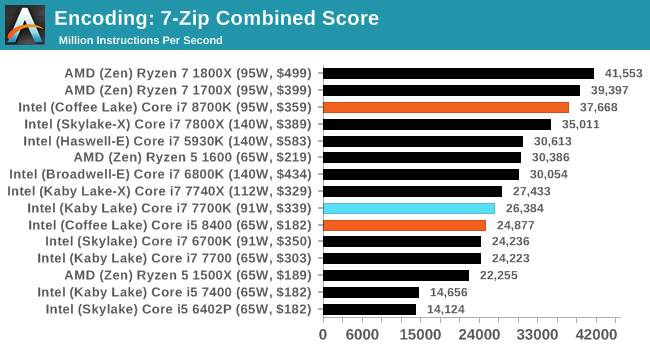
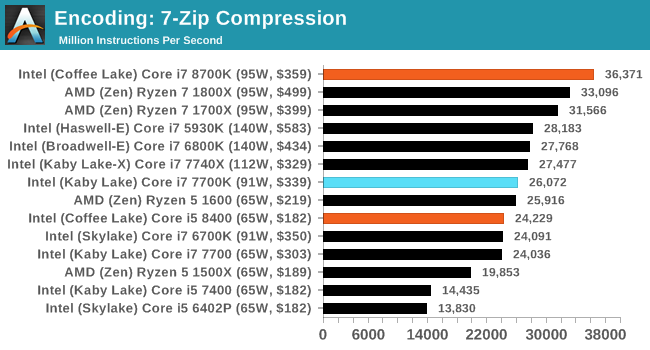
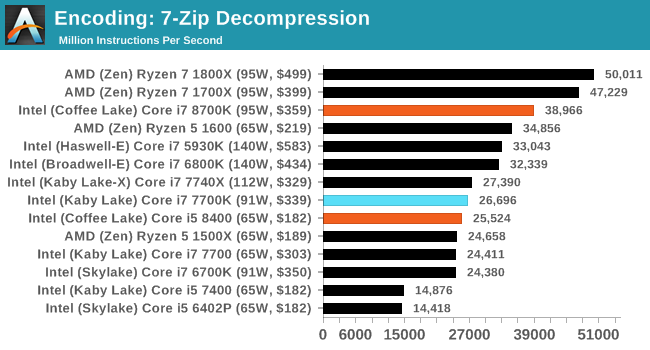
WinRAR 5.40: link
For the 2017 test suite, we move to the latest version of WinRAR in our compression test. WinRAR in some quarters is more user friendly that 7-Zip, hence its inclusion. Rather than use a benchmark mode as we did with 7-Zip, here we take a set of files representative of a generic stack (33 video files in 1.37 GB, 2834 smaller website files in 370 folders in 150 MB) of compressible and incompressible formats. The results shown are the time taken to encode the file. Due to DRAM caching, we run the test 10 times and take the average of the last five runs when the benchmark is in a steady state.
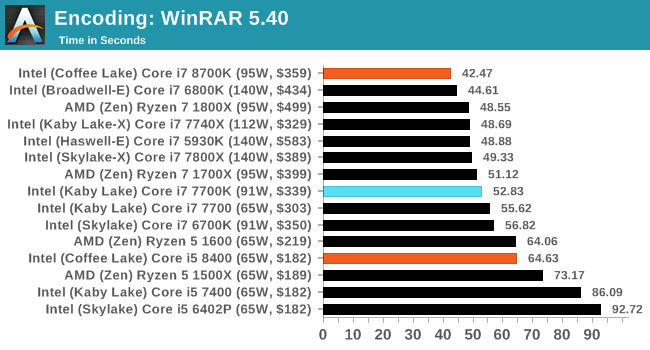
AES Encoding
Algorithms using AES coding have spread far and wide as a ubiquitous tool for encryption. Again, this is another CPU limited test, and modern CPUs have special AES pathways to accelerate their performance. We often see scaling in both frequency and cores with this benchmark. We use the latest version of TrueCrypt and run its benchmark mode over 1GB of in-DRAM data. Results shown are the GB/s average of encryption and decryption.
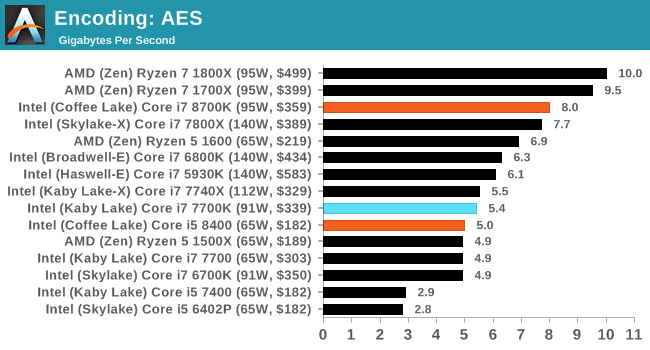
HandBrake v1.0.2 H264 and HEVC: link
As mentioned above, video transcoding (both encode and decode) is a hot topic in performance metrics as more and more content is being created. First consideration is the standard in which the video is encoded, which can be lossless or lossy, trade performance for file-size, trade quality for file-size, or all of the above can increase encoding rates to help accelerate decoding rates. Alongside Google's favorite codec, VP9, there are two others that are taking hold: H264, the older codec, is practically everywhere and is designed to be optimized for 1080p video, and HEVC (or H265) that is aimed to provide the same quality as H264 but at a lower file-size (or better quality for the same size). HEVC is important as 4K is streamed over the air, meaning less bits need to be transferred for the same quality content.
Handbrake is a favored tool for transcoding, and so our test regime takes care of three areas.
Low Quality/Resolution H264: Here we transcode a 640x266 H264 rip of a 2 hour film, and change the encoding from Main profile to High profile, using the very-fast preset.
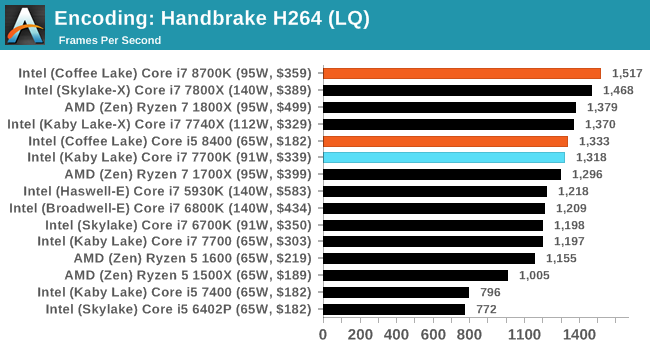
High Quality/Resolution H264: A similar test, but this time we take a ten-minute double 4K (3840x4320) file running at 60 Hz and transcode from Main to High, using the very-fast preset.
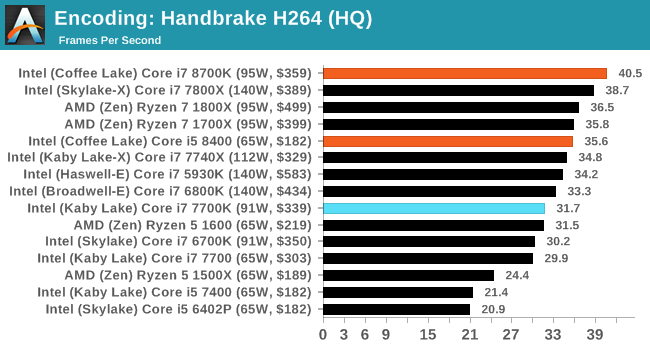
HEVC Test: Using the same video in HQ, we change the resolution and codec of the original video from 4K60 in H264 into 4K60 HEVC.
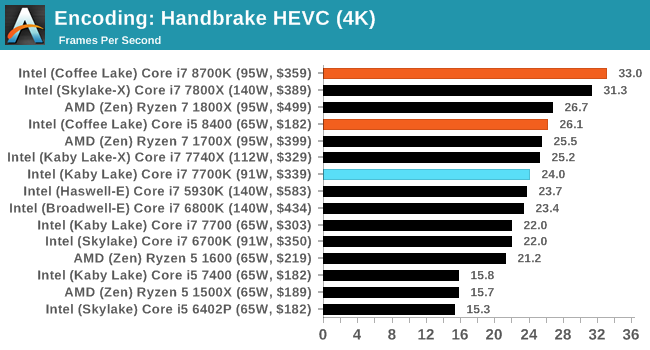










222 Comments
View All Comments
Chaser - Thursday, October 5, 2017 - link
Thank you AMD.vanilla_gorilla - Thursday, October 5, 2017 - link
Exactly! No matter what side you're on, you gotta love the fact that competition is back in the x86 desktop space! And it looks like AMD 1700X is now under $300 on Amazon. Works both ways!TEAMSWITCHER - Friday, October 6, 2017 - link
I just don't see it this way. Since the release of Haswell-E in 2014 we've had sub $400 six core processors. While some like to compartmentalize the industry into mainstream and HEDT, the fact is, I built a machine with similar performance three years ago, for a similar price. Today's full featured Z370 motherboards (like the ROG Maximus X) cost nearly as much as X99 motherboards from 2014. To say that Intel was pushed by AMD is simply not true.watzupken - Friday, October 6, 2017 - link
I feel the fact that Intel had to rush a 6 core mainstream processor out in the same year they introduced Kaby Lake is a sign that AMD is putting pressure on them. You may find a Haswell E chip for sub 400 bucks in 2014, but you need to be mindful that Intel historically have only increase prices due to the lack of competition. Now you are seeing a 6 core mainstream chip from both AMD and Intel below 200 bucks. Motherboard prices are difficult to compare since there are lots of motherboards out there that are over engineered and cost significantly more. Assuming you pick the cheapest Z370 motherboard out there, I don't believe it's more expensive than a X99 board.mapesdhs - Friday, October 6, 2017 - link
KL-X is dead, that's for sure. Some sites claim CFL was not rushed, in which case Intel knew KL-X would be pointless when it was launched. People claiming Intel was not affected by AMD have to choose: either CFL was rushed because of pressure from AMD, or Intel released a CPU for a mismatched platform they knew would be irrelevant within months.There's plenty of evidence Intel was in a hurry here, especially the way X299 was handled, and the horrible heat issues, etc. with SL-X.
mapesdhs - Friday, October 6, 2017 - link
PS. Is it just me or are we almost back to the days of the P4, where Intel tried to maintain a lead really by doing little more than raising clocks? It wasn't that long ago there was much fanfare when Intel released its first minimum-4GHz part (4790K IIRC), even though we all knew they could run their CPUs way quicker than that if need be (stock voltage oc'ing has been very productive for a long time). Now all of a sudden Intel is nearing 5GHz speeds, but it's kinda weird there's no accompanying fanfare given the reaction to their finally reaching 4GHz with the 4790K. At least in th mainstream, has Intel really just reverted to a MHz race to keep its performance up? Seems like it, but OS issues, etc. are preventing those higher bins from kicking in.KAlmquist - Friday, October 6, 2017 - link
Intel has been pushing up clock speeds, but (unlike the P4), not at the expense of IPC. The biggest thing that Intel has done to improve performance in this iteration is to increase the number of cores.mapesdhs - Tuesday, October 10, 2017 - link
Except in reality it's often not that much of a boost at all, and in some cases slower because of how the OS is affecting turbo levels.Remember, Intel could have released a CPU like this a very long time ago. As I keep having to remind people, the 3930K was an 8-core chip with two cores disabled. Back then, AMD couldn't even compete with SB, never mind SB-E, so Intel held back, and indeed X79 never saw a consumer 8-core part, even though the initial 3930K was a XEON-sourced crippled 8-core.
Same applies to the mainstream, we could have had 6 core models ages ago. All they've really done to counter the lack of IPC improvements is boost the clocks way up. We're approaching standard bin levels now that years ago were considered top-notch oc's unless one was definitely using giant air coolers, decent AIOs or better.
wr3zzz - Thursday, October 5, 2017 - link
I hope Anandtech solves the Civ6 AI benchmark soon. It's almost as important as compression and encoding benchmarks for me to decide CPU price-performance options as I am almost always GPU constrained in games.Ian Cutress - Saturday, October 7, 2017 - link
We finally got in contact with the Civ6 dev team to integrate the AI benchmark into our suite better. You should see it moving forward.